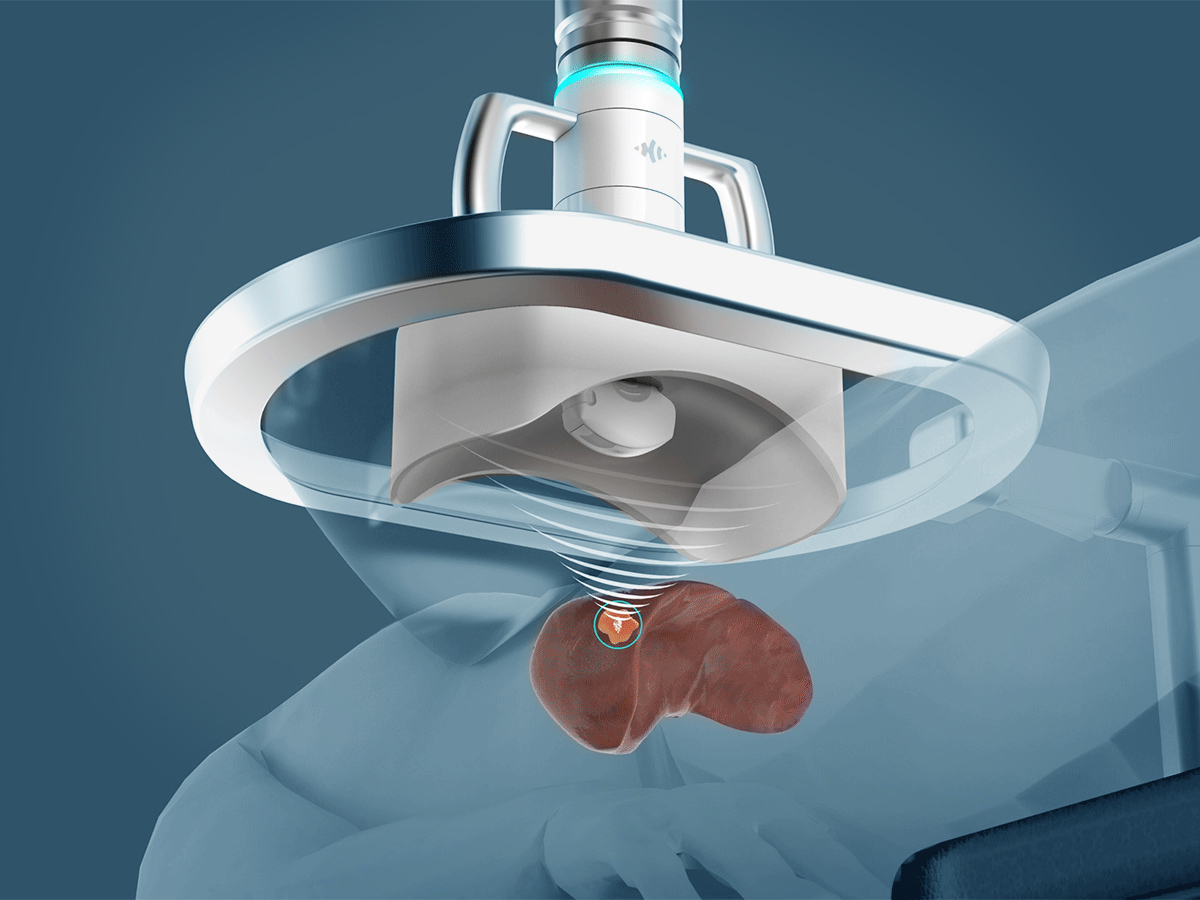
Pulsed ultrasound waves are expanding out-patient care and our multidisciplinary approach.
What is Histotripsy?
Histotripsy is a non-invasive medical procedure that uses high-intensity ultrasound waves to destroy tissue. It is a form of focused ultrasound therapy (FUS) that creates cavitation bubbles within the target tissue, leading to the mechanical disruption and destruction of cancer cells. It has recently been approved for the treatment of liver tumors.
How does histotripsy treat liver cancer?
Patients undergoing histotripsy are given general anesthesia to control breathing and to minimize movements of targeted tumor(s). The procedure takes anywhere from 10 to 50 minutes per tumor.
“I tell them this is “Star Wars” technology because there are no cuts, there’s no poking, there there’s nothing that’s going inside you from outside. It’s all happening with a focused beam of ultrasound to destroy the tumors.”
– Jennifer Linehan, MD
Who is the candidate for histotripsy?
Histotripsy is used exclusively for liver cancers currently. However, it can be any kind of liver tumor, whether it’s a primary tumor (a cancer that starts in the tumor) or another type of cancer that metastasized or spread to the tumor. Currently, histotripsy is evaluated in clinical trials for tumors in other organs.
Each patient being considered for histotripsy is carefully evaluated by a multidisciplinary team made up of, surgical oncologist, interventional radiologist, radiation oncologist, and GI medical oncologist.
This technology is intended to treat individual tumors, particularly in situations when surgery or some other treatment, such as ablation, would be too risky.
How Histotripsy Kills Tumors and Cancer.
Dr. Jennifer Linehan explains the benefits of histotripsy of live and its potential for other cancers.
What is the Abscopal Effect?
In discussing the abscopal effect, a phenomenon where regression of tumors occurs in areas of the body that are not directly treated with radiation therapy or other local treatments, Dr. Linehan describes how the effects of histotripsy could benefit other treatments. Similar to radiation treatment, the body’s natural response to the treatment area has the potential to boost immunoresponse. Though still being studied with histotripsy, she believes there is potential for this benefit.
“One of the unique things about histotripsy, we suspect, that also does happen with radiation, is it creates what we call an abscopal effect, where because it causes inflammation in that area where you’ve treated the tumor it makes we believe immunotherapies some sometimes even chemotherapies work better.”
– Jennifer Linehan, MD
Benefits and potential side effects of histotripsy?
Histotripsy is an outpatient, non-invasive, targeted, and single treatment procedure. There are no side effects. Like with all other cancers, there can be a risk of cancer coming back, either at the site of treatment or somewhere else.
Interventional Radiology
As part of any cancer treatment plan, there may include a multidisciplinary team of experts who will go over optimal treatment. For liver cancer, that may include an interventional radiologist for histotripsy.
Dr. David Tran is an interventional radiologist at Saint John’s Health Center in Santa Monica, California. His clinical expertise is in image guided cancer therapies, including liver directed Y90 radioembolization and tumor ablations.
Dr. Tran, alongside Dr. Jennifer Linehan, urologic surgical oncologist, and Dr. Anton Bilchik, gastrointestinal and hepatobiliary surgical oncologist, will be overseeing histotripsy procedures at Saint John’s Health Center.
Learn More About Histotripsy Now Offered at Saint John’s Health Center
- For more information about histotripsy treatment, please see Histotripsy for Liver Cancer.
- To learn more about liver cancer treatments, please see Liver Cancer Treatment.
Thank You to Our Donors!
We extend our deepest thanks for the unwavering generosity and commitment to advancing life-saving treatments and groundbreaking innovations at Saint John’s Health Center. Your invaluable and timely contributions continue to empower programs that elevate the standard of care, ensuring we can deliver the most advanced medical solutions available for our patients. From minimally invasive robotics to enhancing critical services and research, your support is transforming lives and shaping the future of healthcare every day.
“The Riordan Foundation is proud to support the introduction of the histotripsy system to Saint John’s, empowering the incredible physicians at the health center to continue providing exceptional care for all.”
– Elizabeth Gregory Riordan

Learn more
SaintJohnsFoundation.org
How You Can Support


